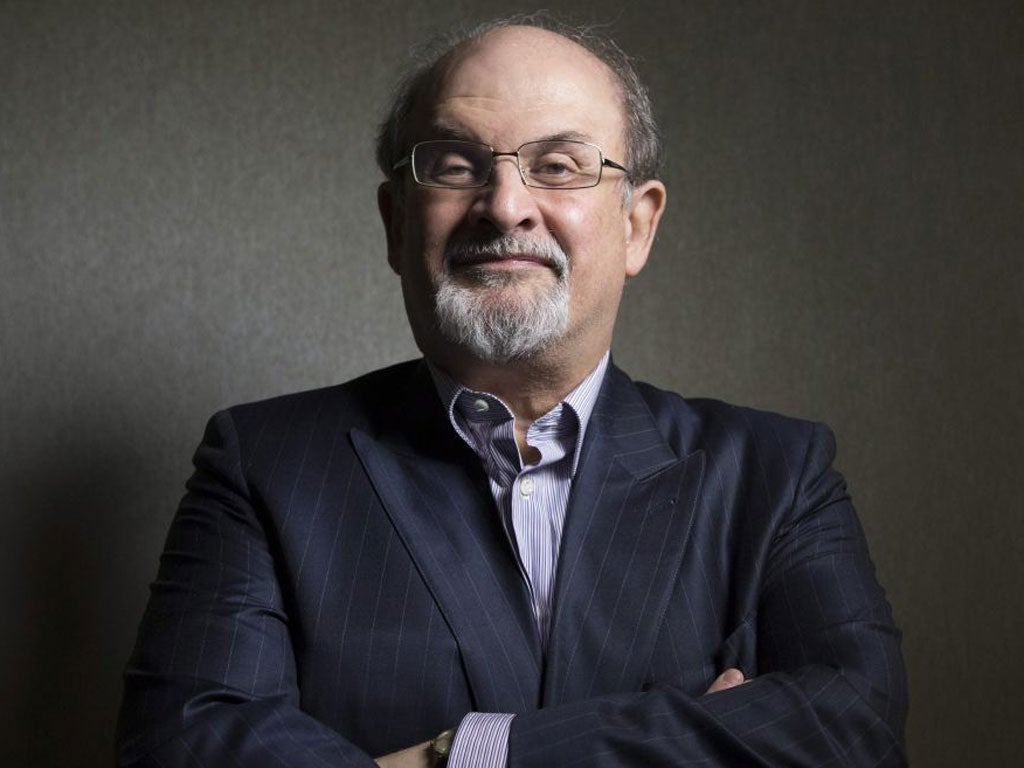Top authors denounce $500,000 new bounty on Rushdie
Iranian foundation raises reward for execution of dormant 1989 fatwa, citing anti-Mohamed film

Your support helps us to tell the story
From reproductive rights to climate change to Big Tech, The Independent is on the ground when the story is developing. Whether it's investigating the financials of Elon Musk's pro-Trump PAC or producing our latest documentary, 'The A Word', which shines a light on the American women fighting for reproductive rights, we know how important it is to parse out the facts from the messaging.
At such a critical moment in US history, we need reporters on the ground. Your donation allows us to keep sending journalists to speak to both sides of the story.
The Independent is trusted by Americans across the entire political spectrum. And unlike many other quality news outlets, we choose not to lock Americans out of our reporting and analysis with paywalls. We believe quality journalism should be available to everyone, paid for by those who can afford it.
Your support makes all the difference.Best-selling authors rallied to support Sir Salman Rushdie last night over the announcement by an Iranian religious foundation that it was raising its bounty for his murder.
Sir Salman is in New York where he is promoting the publication of a memoir chronicling his time living under a fatwa imposed by the late Ayatollah Khomeini over his novel, The Satanic Verses. The tour has been overshadowed by a declaration from religious leader Hassan Sanei, head of the semi-official 15 Khordad Foundation, that he was adding another $500,000 to the hardline group's existing reward of $2.8m for killing the novelist.
It raised the bounty in protest at the online film The Innocence of Muslims which has sparked violent outrage in parts of the Islamic world. "Surely if the sentence of the Imam [Khomeini] had been carried out, the later insults in the form of caricatures, articles and the making of movies would not have occurred," Ayatollah Sanei said. The British Government called for urgent action against the foundation.
Sir Salman has already criticised the film describing it as "a piece of crap… very poorly done and malevolent". But he added: "To react to it with this kind of violence is just ludicrously inappropriate. People are being attacked who had nothing to do with it and that is not right." Sir Salman told The Independent that the foundation's announcement was not a fatwa – which was officially lifted in 1998 when Tehran reopened diplomatic relations with Britain – but a "raising of money". He declined to answer further questions.
Fellow authors and members of English PEN, which promotes free speech, urged others to back him. Hanif Kureishi said: "Through his extraordinary books and bravery in the face of intolerance, Salman Rushdie has shown the world that literature and free speech can never be taken for granted." Fay Weldon called for a "united front of defiance". She said: "Appeasement is no answer, and why we drifted into the trouble we are in today." Lisa Appignanesi said: "Yet again a novelist is being used by politicians in their political machinations."
In a BBC interview promoting his memoir, Joseph Anton – the pseudonym he adopted while in hiding during the fatwa – Sir Salman said he thought "a book which was critical of Islam would be difficult to be published now".
The Foreign Office said: "We call on the government of Iran to take firm and urgent action on organisations in Iran that are encouraging or offering rewards for the murder of Mr Rushdie."
A 23-year story: The fatwa in brief
The 1988 Booker Prize finalist The Satanic Verses prompted fury among Muslims for its allegedly blasphemous imagining of the life of the Prophet Mohamed. Copies of the book were burnt on the streets of Bradford and prompted a riot in Pakistan. In 1989 the late Ayatollah Khomeini issued a religious order – a fatwa – urging Muslims to kill the writer. Rushdie was forced into hiding.
He was never harmed although the book's Japanese translator Hitoshi Igarashi was stabbed to death in 1991. The Italian translator Ettore Caprioli and Norwegian publisher William Nygaard survived attempts on their lives. An arson attack in Turkey in which 35 people died was also linked to the novel.
The Satanic Verses remains banned across the Muslim world. Earlier this year Rushdie was forced to cancel a trip to a festival in Jaipur after extremist threats.
The fatwa was revoked in 1998 when Britain and Iran resumed diplomatic relations. The 15 Khordad Foundation has refused to recognise the end of the fatwa.
Join our commenting forum
Join thought-provoking conversations, follow other Independent readers and see their replies
Comments